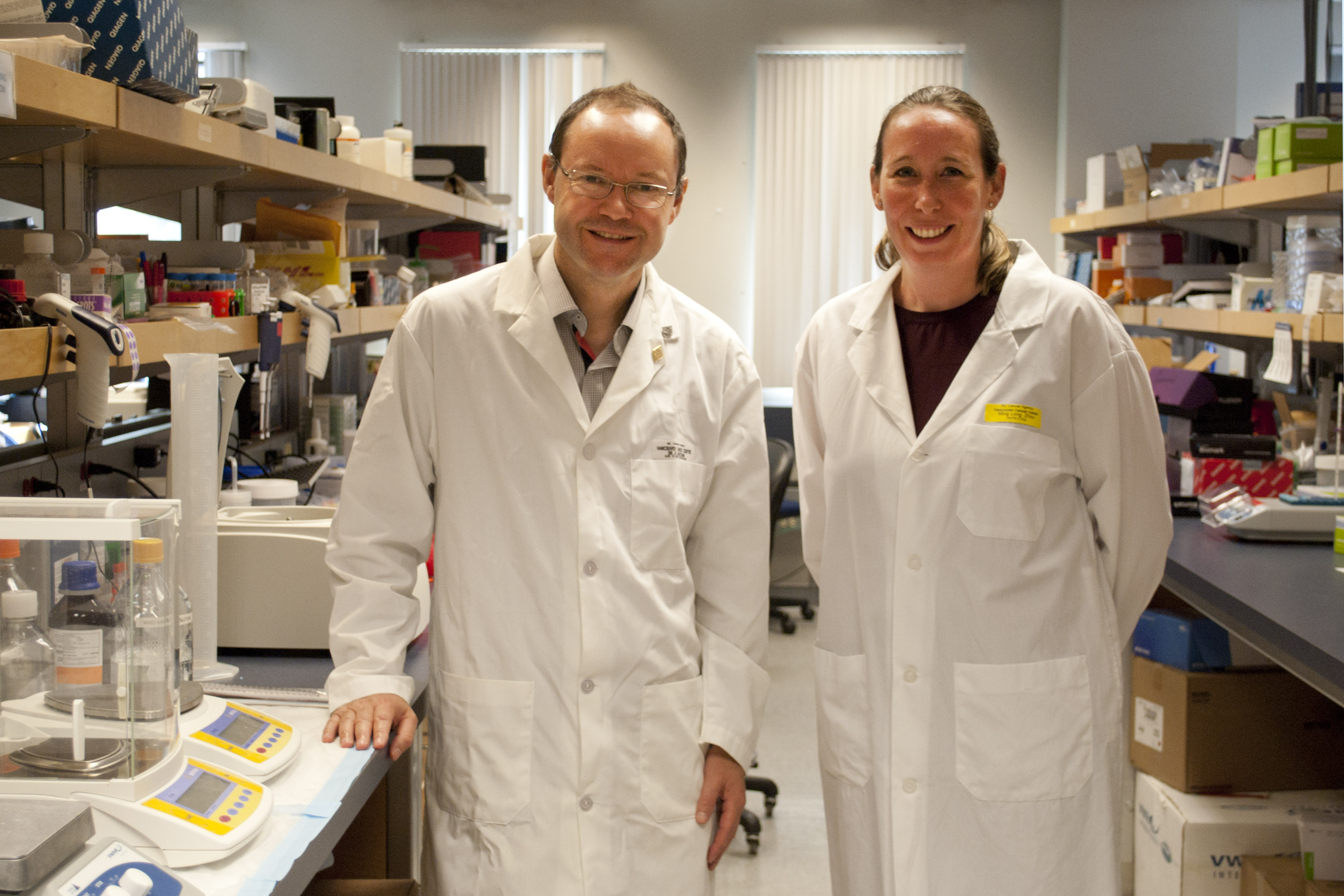 Dr. David Huntsman with Dr. Melissa McConechy, first author of the published JNCI paper
Dr. David Huntsman with Dr. Melissa McConechy, first author of the published JNCI paper
Terry Fox-funded cancer researchers in BC led an international study to develop a new method to improve diagnosis of a rare sub-type of ovarian cancer that has been notoriously difficult to accurately identify. The team has created an algorithm to diagnose and predict the clinical course of granulosa cell cancers of the ovary.
“Effective cancer treatments rely on having an accurate diagnosis in the first place, and the results of our research underline the importance of this,” says lead investigator Dr. David Huntsman, the Dr. Chew Wei Memorial Professor of Gynecologic Oncology at the University of British Columbia and scientific leader of OVCARE, British Columbia’s multidisciplinary ovarian cancer research program.
Outcomes for adult-type granulosa cell tumours (AGCTs), which make up 3-5% of ovarian cancers, seemed to be all over the place. While standard diagnosis of AGCT is based on how tumour tissue appears under a microscope, recent research found that many AGCTs had a mutation in the FOXL2 gene. The Vancouver-based team wanted to study this genetic aspect in more detail to see if FOXL2 could be used as a robust marker for the disease.
For their study, the group used historical cases of tumours categorized as AGCT of the ovary from three major European centres. “While the cases we examined had the most accurate diagnosis possible at the time, our team found that about 20 per cent were actually of different sub-types of ovarian cancer. By assessing only the true cases of AGCT, a clearer picture emerged: the survival rates were very high for those with true AGCT and more than 95 per cent of those cases had a mutation in the FOXL2 gene, making it a disease defining marker to use in diagnosis,” explains Dr. Huntsman.
The majority of deaths attributed to AGCT in the study were actually caused by aggressive forms of other types of ovarian cancer, says Dr. Huntsman, head of TFRI’s New Frontiers Program Project Grant in the Genomics of Forme Fruste Tumours. The project studies rare tumours; historically, research on these kinds of tumours has yielded knowledge on our understanding of common cancers.
Dr. Huntsman says their research produced other important information for patients and doctors. “For those with true AGCT we realize that the prognosis is actually very good, removing a great deal of stress for patients and their families. For those who might have previously been diagnosed with AGCT, but who actually have a different form of ovarian cancer, this method will prompt clinicians to follow-up with further tests for an accurate diagnosis and ensure a more appropriate treatment plan. We wrote the paper with future patients in mind and hope it will be used by health care providers to help explain the implications of this diagnosis and in many cases mitigate the fear that comes with a cancer diagnosis.”
The research paper was published online in June 2016 in the Journal of the National Cancer Institute.
More information
The Terry Fox New Frontiers Program Project Grant in the Genomics of Forme Fruste Tumours has been funded by the Terry Fox Research Institute since 2010. Forme Fruste tumours are rare and unusual tumours that can pose a huge challenge to clinicians due to the low prevalence of each individual disease. Historically, research on rare cancers has directly impacted the way more common cancers have been studied and understood.
About TFRI
Launched in October 2007, The Terry Fox Research Institute is the brainchild of The Terry Fox Foundation and today functions as its research arm. TFRI seeks to improve significantly the outcomes of cancer research for the patient through a highly collaborative, team-oriented, milestone-based approach to research that will enable discoveries to translate quickly into practical solutions for cancer patients worldwide. TFRI collaborates with over 70 cancer hospitals and research organizations across Canada. TFRI headquarters are in Vancouver, BC. www.tfri.ca
About OVCARE
OVCARE (www.ovcare.ca) is British Columbia’s multidisciplinary and multi-institutional ovarian cancer research team. OVCARE operations including the work described in this manuscript are performed at the BC Cancer Agency and the Vancouver General Hospital. In addition to peer reviewed funding from TFRI and other agencies, OVCARE is generously supported by the BC Cancer Foundation, the Vancouver General Hospital and UBC Hospital Foundation and UBC Faculty of Medicine.